Professional Identity and Practice: Skills, Theories and Analysis
VerifiedAdded on 2023/01/11
|8
|2069
|35
Report
AI Summary
This report delves into the multifaceted aspects of professional identity and practice, focusing on the significance of ongoing professional development within the context of the Hilton Hotels brand. It explores the key benefits of continuous development for various stakeholders, including employees and employers, emphasizing the enhancement of skills and capabilities within the workforce. The report analyzes professional employer expectations, highlighting the importance of both soft and hard skills, as well as cultural awareness and teamwork. Furthermore, it includes a self-assessment of skills, abilities, and competencies relevant to a General Manager role, utilizing SWOT analysis and skill audits to identify strengths, weaknesses, opportunities, and threats. The report also reviews a range of learning theories and approaches, such as behaviorist and humanist approaches, and models like Honey and Mumford's learning cycle and Kolb's learning cycle, to facilitate personal and professional development. The analysis underscores the critical role of continuous learning and self-improvement in achieving career goals and adapting to the evolving demands of the professional landscape.
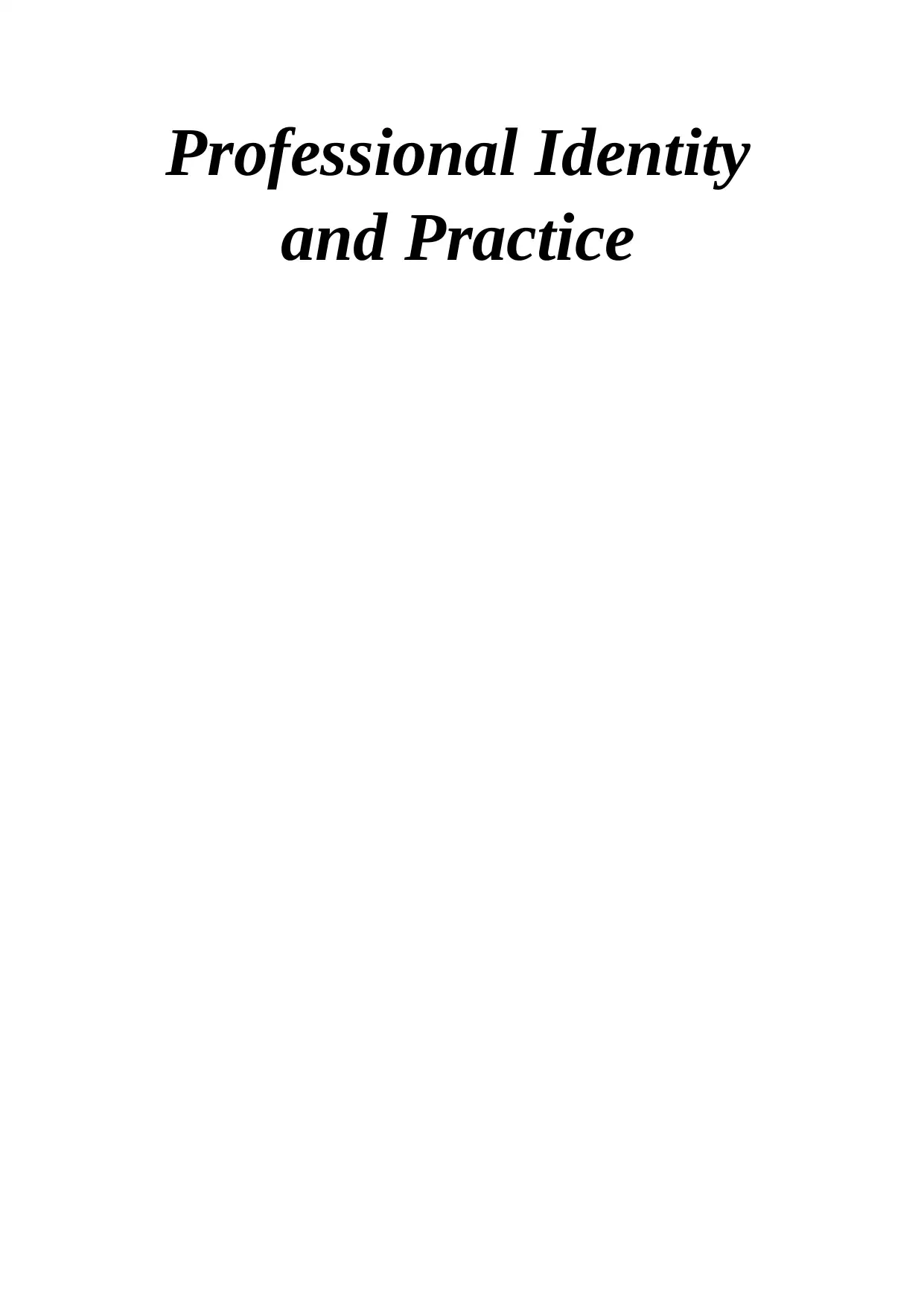
Professional Identity
and Practice
and Practice
Paraphrase This Document
Need a fresh take? Get an instant paraphrase of this document with our AI Paraphraser
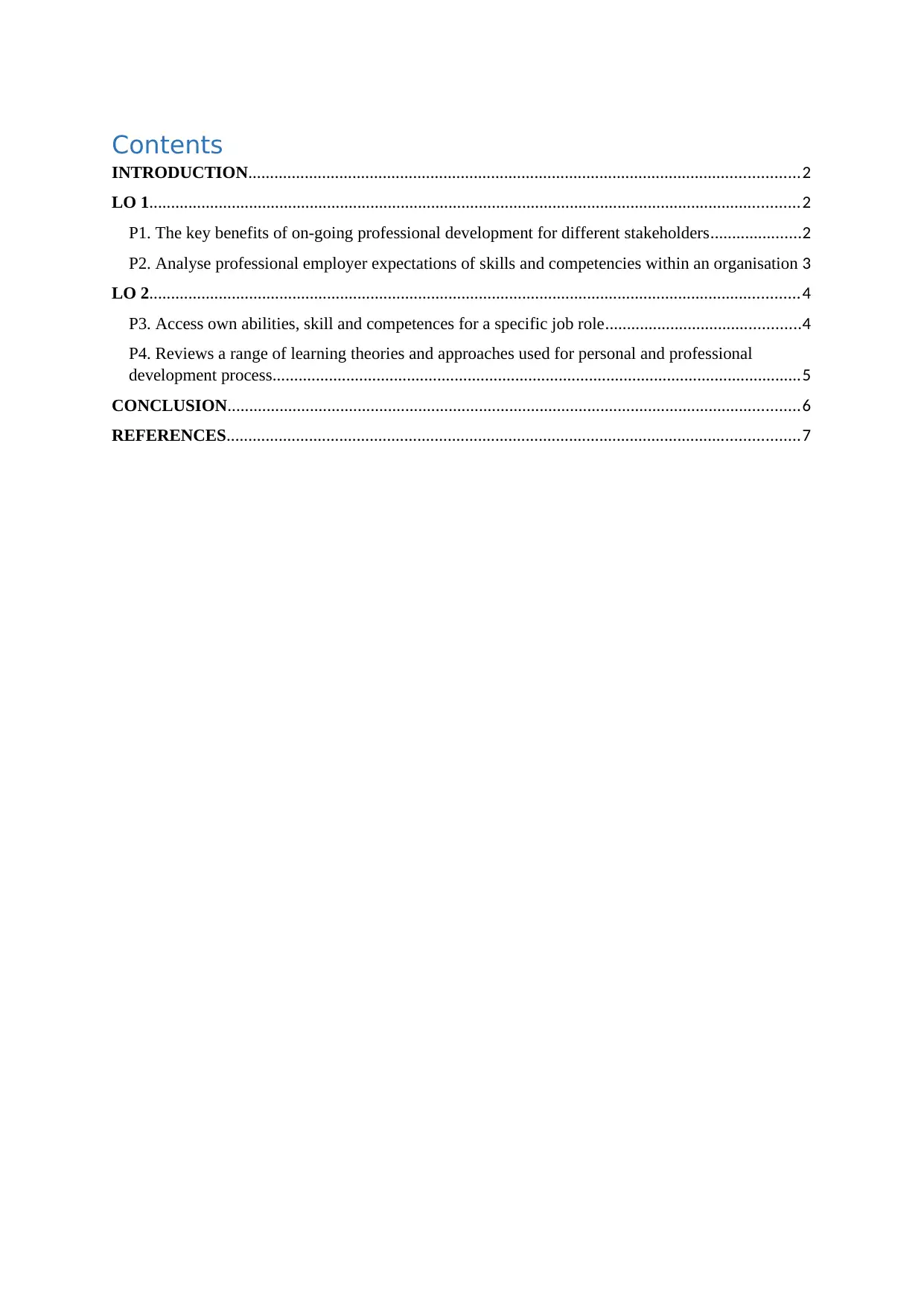
Contents
INTRODUCTION...............................................................................................................................2
LO 1......................................................................................................................................................2
P1. The key benefits of on-going professional development for different stakeholders.....................2
P2. Analyse professional employer expectations of skills and competencies within an organisation 3
LO 2......................................................................................................................................................4
P3. Access own abilities, skill and competences for a specific job role.............................................4
P4. Reviews a range of learning theories and approaches used for personal and professional
development process..........................................................................................................................5
CONCLUSION....................................................................................................................................6
REFERENCES....................................................................................................................................7
INTRODUCTION...............................................................................................................................2
LO 1......................................................................................................................................................2
P1. The key benefits of on-going professional development for different stakeholders.....................2
P2. Analyse professional employer expectations of skills and competencies within an organisation 3
LO 2......................................................................................................................................................4
P3. Access own abilities, skill and competences for a specific job role.............................................4
P4. Reviews a range of learning theories and approaches used for personal and professional
development process..........................................................................................................................5
CONCLUSION....................................................................................................................................6
REFERENCES....................................................................................................................................7
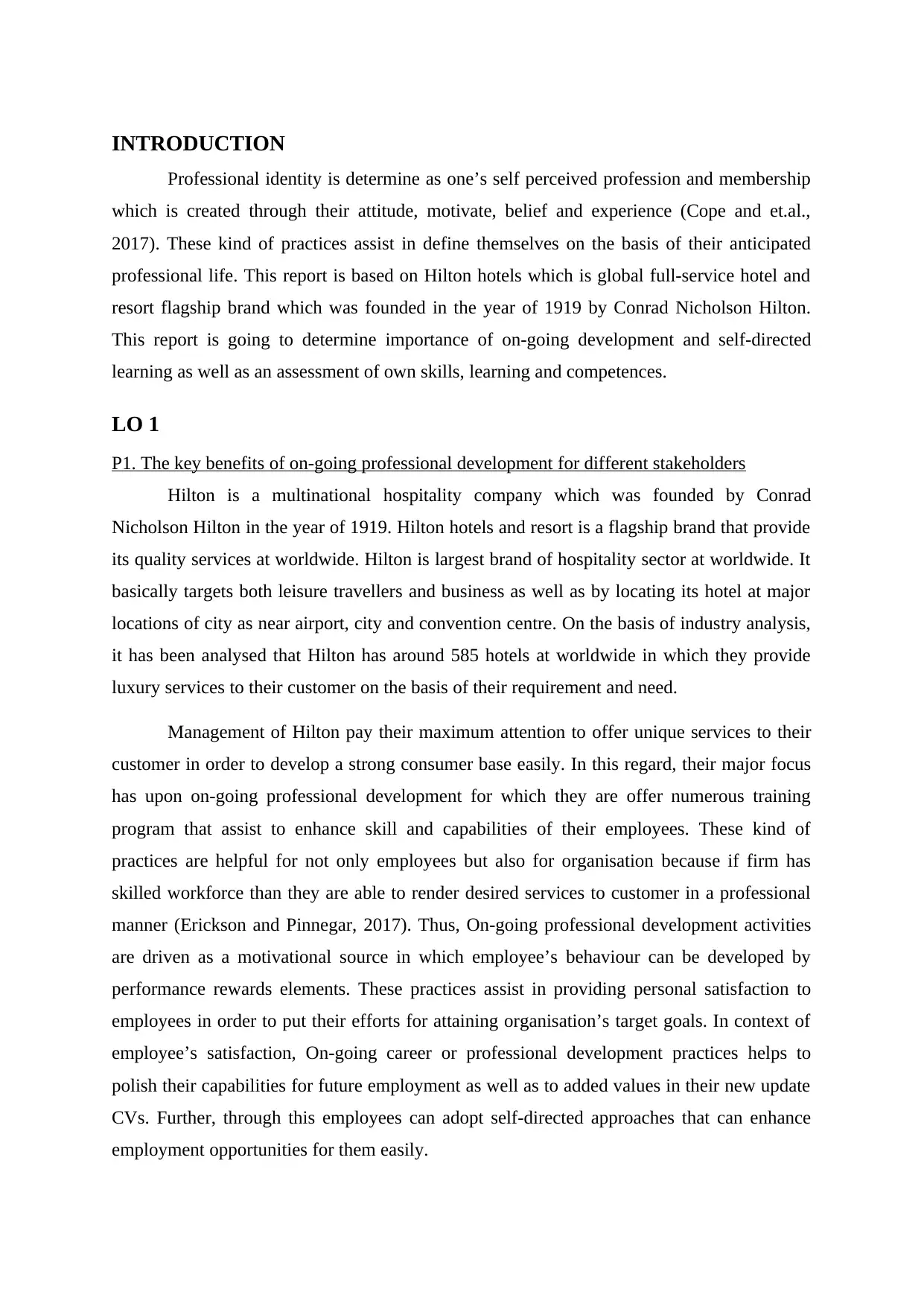
INTRODUCTION
Professional identity is determine as one’s self perceived profession and membership
which is created through their attitude, motivate, belief and experience (Cope and et.al.,
2017). These kind of practices assist in define themselves on the basis of their anticipated
professional life. This report is based on Hilton hotels which is global full-service hotel and
resort flagship brand which was founded in the year of 1919 by Conrad Nicholson Hilton.
This report is going to determine importance of on-going development and self-directed
learning as well as an assessment of own skills, learning and competences.
LO 1
P1. The key benefits of on-going professional development for different stakeholders
Hilton is a multinational hospitality company which was founded by Conrad
Nicholson Hilton in the year of 1919. Hilton hotels and resort is a flagship brand that provide
its quality services at worldwide. Hilton is largest brand of hospitality sector at worldwide. It
basically targets both leisure travellers and business as well as by locating its hotel at major
locations of city as near airport, city and convention centre. On the basis of industry analysis,
it has been analysed that Hilton has around 585 hotels at worldwide in which they provide
luxury services to their customer on the basis of their requirement and need.
Management of Hilton pay their maximum attention to offer unique services to their
customer in order to develop a strong consumer base easily. In this regard, their major focus
has upon on-going professional development for which they are offer numerous training
program that assist to enhance skill and capabilities of their employees. These kind of
practices are helpful for not only employees but also for organisation because if firm has
skilled workforce than they are able to render desired services to customer in a professional
manner (Erickson and Pinnegar, 2017). Thus, On-going professional development activities
are driven as a motivational source in which employee’s behaviour can be developed by
performance rewards elements. These practices assist in providing personal satisfaction to
employees in order to put their efforts for attaining organisation’s target goals. In context of
employee’s satisfaction, On-going career or professional development practices helps to
polish their capabilities for future employment as well as to added values in their new update
CVs. Further, through this employees can adopt self-directed approaches that can enhance
employment opportunities for them easily.
Professional identity is determine as one’s self perceived profession and membership
which is created through their attitude, motivate, belief and experience (Cope and et.al.,
2017). These kind of practices assist in define themselves on the basis of their anticipated
professional life. This report is based on Hilton hotels which is global full-service hotel and
resort flagship brand which was founded in the year of 1919 by Conrad Nicholson Hilton.
This report is going to determine importance of on-going development and self-directed
learning as well as an assessment of own skills, learning and competences.
LO 1
P1. The key benefits of on-going professional development for different stakeholders
Hilton is a multinational hospitality company which was founded by Conrad
Nicholson Hilton in the year of 1919. Hilton hotels and resort is a flagship brand that provide
its quality services at worldwide. Hilton is largest brand of hospitality sector at worldwide. It
basically targets both leisure travellers and business as well as by locating its hotel at major
locations of city as near airport, city and convention centre. On the basis of industry analysis,
it has been analysed that Hilton has around 585 hotels at worldwide in which they provide
luxury services to their customer on the basis of their requirement and need.
Management of Hilton pay their maximum attention to offer unique services to their
customer in order to develop a strong consumer base easily. In this regard, their major focus
has upon on-going professional development for which they are offer numerous training
program that assist to enhance skill and capabilities of their employees. These kind of
practices are helpful for not only employees but also for organisation because if firm has
skilled workforce than they are able to render desired services to customer in a professional
manner (Erickson and Pinnegar, 2017). Thus, On-going professional development activities
are driven as a motivational source in which employee’s behaviour can be developed by
performance rewards elements. These practices assist in providing personal satisfaction to
employees in order to put their efforts for attaining organisation’s target goals. In context of
employee’s satisfaction, On-going career or professional development practices helps to
polish their capabilities for future employment as well as to added values in their new update
CVs. Further, through this employees can adopt self-directed approaches that can enhance
employment opportunities for them easily.
⊘ This is a preview!⊘
Do you want full access?
Subscribe today to unlock all pages.

Trusted by 1+ million students worldwide
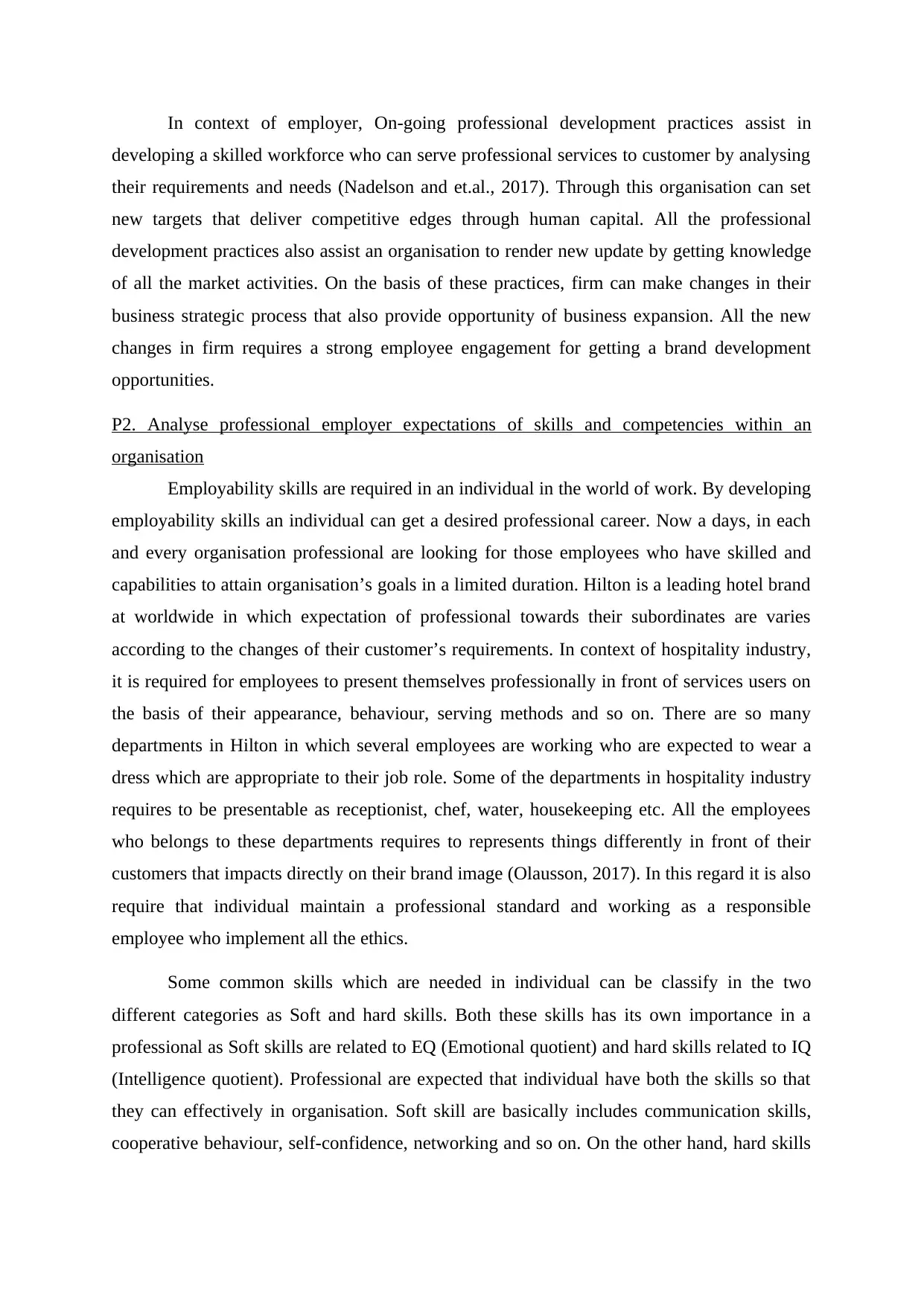
In context of employer, On-going professional development practices assist in
developing a skilled workforce who can serve professional services to customer by analysing
their requirements and needs (Nadelson and et.al., 2017). Through this organisation can set
new targets that deliver competitive edges through human capital. All the professional
development practices also assist an organisation to render new update by getting knowledge
of all the market activities. On the basis of these practices, firm can make changes in their
business strategic process that also provide opportunity of business expansion. All the new
changes in firm requires a strong employee engagement for getting a brand development
opportunities.
P2. Analyse professional employer expectations of skills and competencies within an
organisation
Employability skills are required in an individual in the world of work. By developing
employability skills an individual can get a desired professional career. Now a days, in each
and every organisation professional are looking for those employees who have skilled and
capabilities to attain organisation’s goals in a limited duration. Hilton is a leading hotel brand
at worldwide in which expectation of professional towards their subordinates are varies
according to the changes of their customer’s requirements. In context of hospitality industry,
it is required for employees to present themselves professionally in front of services users on
the basis of their appearance, behaviour, serving methods and so on. There are so many
departments in Hilton in which several employees are working who are expected to wear a
dress which are appropriate to their job role. Some of the departments in hospitality industry
requires to be presentable as receptionist, chef, water, housekeeping etc. All the employees
who belongs to these departments requires to represents things differently in front of their
customers that impacts directly on their brand image (Olausson, 2017). In this regard it is also
require that individual maintain a professional standard and working as a responsible
employee who implement all the ethics.
Some common skills which are needed in individual can be classify in the two
different categories as Soft and hard skills. Both these skills has its own importance in a
professional as Soft skills are related to EQ (Emotional quotient) and hard skills related to IQ
(Intelligence quotient). Professional are expected that individual have both the skills so that
they can effectively in organisation. Soft skill are basically includes communication skills,
cooperative behaviour, self-confidence, networking and so on. On the other hand, hard skills
developing a skilled workforce who can serve professional services to customer by analysing
their requirements and needs (Nadelson and et.al., 2017). Through this organisation can set
new targets that deliver competitive edges through human capital. All the professional
development practices also assist an organisation to render new update by getting knowledge
of all the market activities. On the basis of these practices, firm can make changes in their
business strategic process that also provide opportunity of business expansion. All the new
changes in firm requires a strong employee engagement for getting a brand development
opportunities.
P2. Analyse professional employer expectations of skills and competencies within an
organisation
Employability skills are required in an individual in the world of work. By developing
employability skills an individual can get a desired professional career. Now a days, in each
and every organisation professional are looking for those employees who have skilled and
capabilities to attain organisation’s goals in a limited duration. Hilton is a leading hotel brand
at worldwide in which expectation of professional towards their subordinates are varies
according to the changes of their customer’s requirements. In context of hospitality industry,
it is required for employees to present themselves professionally in front of services users on
the basis of their appearance, behaviour, serving methods and so on. There are so many
departments in Hilton in which several employees are working who are expected to wear a
dress which are appropriate to their job role. Some of the departments in hospitality industry
requires to be presentable as receptionist, chef, water, housekeeping etc. All the employees
who belongs to these departments requires to represents things differently in front of their
customers that impacts directly on their brand image (Olausson, 2017). In this regard it is also
require that individual maintain a professional standard and working as a responsible
employee who implement all the ethics.
Some common skills which are needed in individual can be classify in the two
different categories as Soft and hard skills. Both these skills has its own importance in a
professional as Soft skills are related to EQ (Emotional quotient) and hard skills related to IQ
(Intelligence quotient). Professional are expected that individual have both the skills so that
they can effectively in organisation. Soft skill are basically includes communication skills,
cooperative behaviour, self-confidence, networking and so on. On the other hand, hard skills
Paraphrase This Document
Need a fresh take? Get an instant paraphrase of this document with our AI Paraphraser
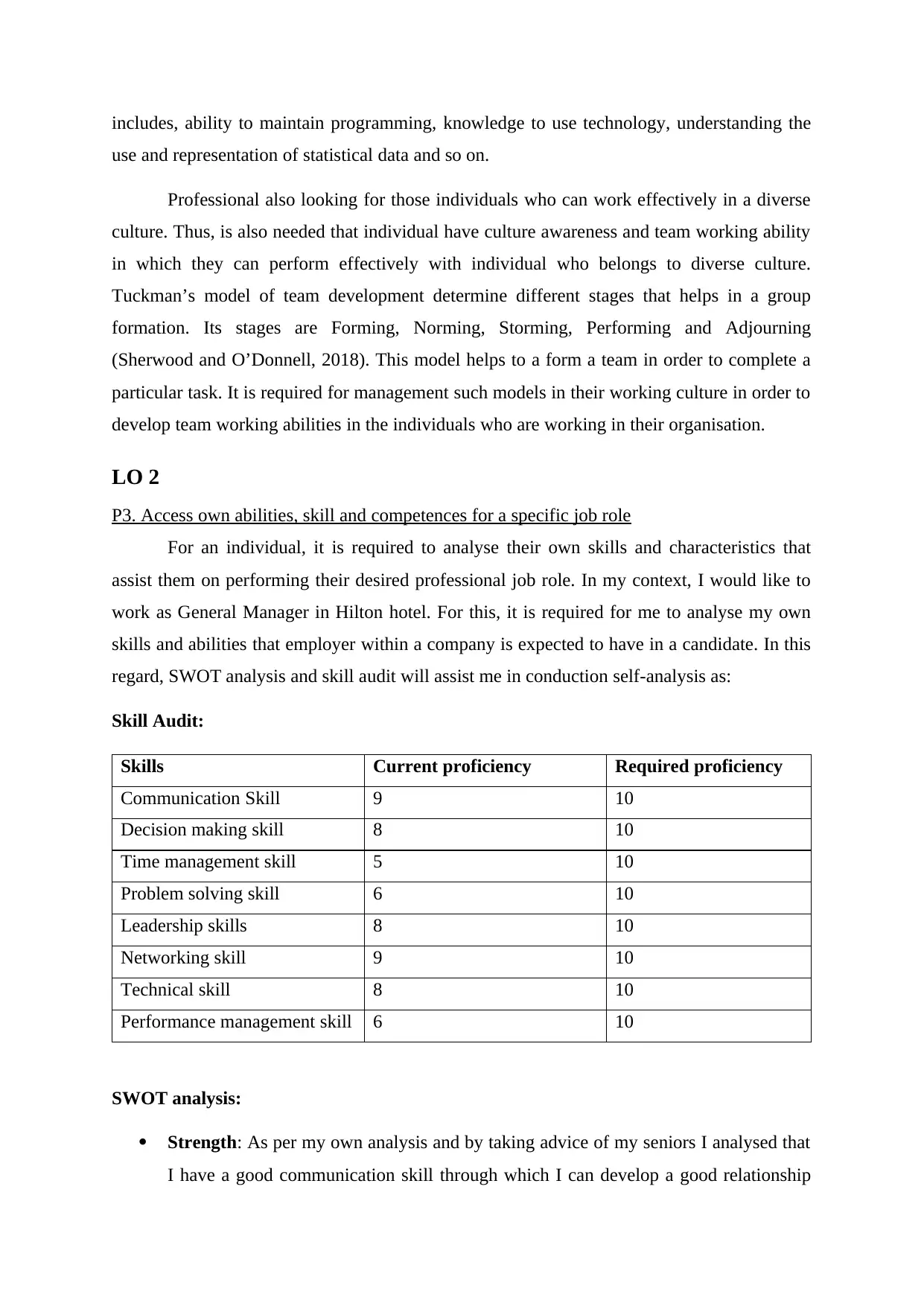
includes, ability to maintain programming, knowledge to use technology, understanding the
use and representation of statistical data and so on.
Professional also looking for those individuals who can work effectively in a diverse
culture. Thus, is also needed that individual have culture awareness and team working ability
in which they can perform effectively with individual who belongs to diverse culture.
Tuckman’s model of team development determine different stages that helps in a group
formation. Its stages are Forming, Norming, Storming, Performing and Adjourning
(Sherwood and O’Donnell, 2018). This model helps to a form a team in order to complete a
particular task. It is required for management such models in their working culture in order to
develop team working abilities in the individuals who are working in their organisation.
LO 2
P3. Access own abilities, skill and competences for a specific job role
For an individual, it is required to analyse their own skills and characteristics that
assist them on performing their desired professional job role. In my context, I would like to
work as General Manager in Hilton hotel. For this, it is required for me to analyse my own
skills and abilities that employer within a company is expected to have in a candidate. In this
regard, SWOT analysis and skill audit will assist me in conduction self-analysis as:
Skill Audit:
Skills Current proficiency Required proficiency
Communication Skill 9 10
Decision making skill 8 10
Time management skill 5 10
Problem solving skill 6 10
Leadership skills 8 10
Networking skill 9 10
Technical skill 8 10
Performance management skill 6 10
SWOT analysis:
Strength: As per my own analysis and by taking advice of my seniors I analysed that
I have a good communication skill through which I can develop a good relationship
use and representation of statistical data and so on.
Professional also looking for those individuals who can work effectively in a diverse
culture. Thus, is also needed that individual have culture awareness and team working ability
in which they can perform effectively with individual who belongs to diverse culture.
Tuckman’s model of team development determine different stages that helps in a group
formation. Its stages are Forming, Norming, Storming, Performing and Adjourning
(Sherwood and O’Donnell, 2018). This model helps to a form a team in order to complete a
particular task. It is required for management such models in their working culture in order to
develop team working abilities in the individuals who are working in their organisation.
LO 2
P3. Access own abilities, skill and competences for a specific job role
For an individual, it is required to analyse their own skills and characteristics that
assist them on performing their desired professional job role. In my context, I would like to
work as General Manager in Hilton hotel. For this, it is required for me to analyse my own
skills and abilities that employer within a company is expected to have in a candidate. In this
regard, SWOT analysis and skill audit will assist me in conduction self-analysis as:
Skill Audit:
Skills Current proficiency Required proficiency
Communication Skill 9 10
Decision making skill 8 10
Time management skill 5 10
Problem solving skill 6 10
Leadership skills 8 10
Networking skill 9 10
Technical skill 8 10
Performance management skill 6 10
SWOT analysis:
Strength: As per my own analysis and by taking advice of my seniors I analysed that
I have a good communication skill through which I can develop a good relationship
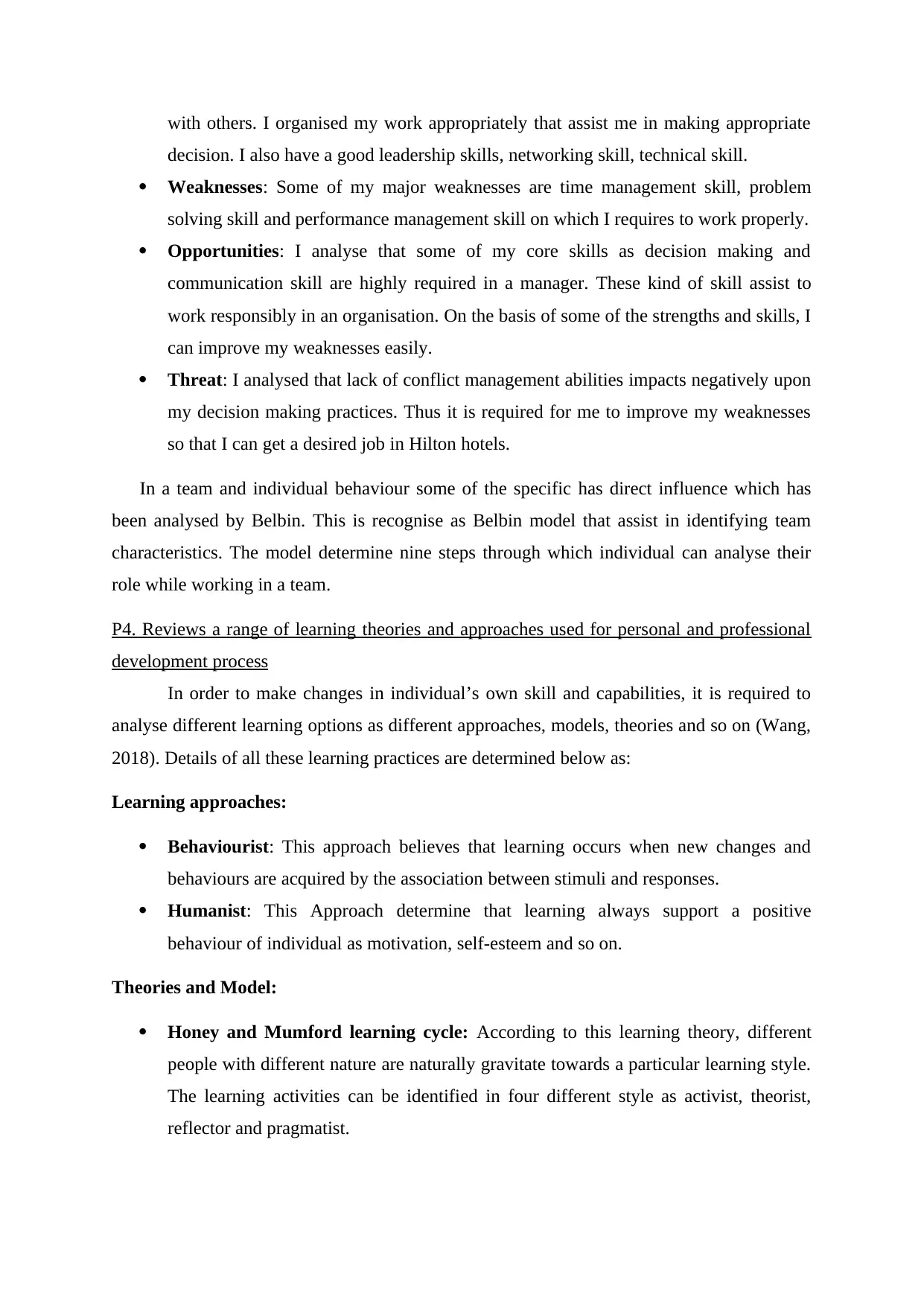
with others. I organised my work appropriately that assist me in making appropriate
decision. I also have a good leadership skills, networking skill, technical skill.
Weaknesses: Some of my major weaknesses are time management skill, problem
solving skill and performance management skill on which I requires to work properly.
Opportunities: I analyse that some of my core skills as decision making and
communication skill are highly required in a manager. These kind of skill assist to
work responsibly in an organisation. On the basis of some of the strengths and skills, I
can improve my weaknesses easily.
Threat: I analysed that lack of conflict management abilities impacts negatively upon
my decision making practices. Thus it is required for me to improve my weaknesses
so that I can get a desired job in Hilton hotels.
In a team and individual behaviour some of the specific has direct influence which has
been analysed by Belbin. This is recognise as Belbin model that assist in identifying team
characteristics. The model determine nine steps through which individual can analyse their
role while working in a team.
P4. Reviews a range of learning theories and approaches used for personal and professional
development process
In order to make changes in individual’s own skill and capabilities, it is required to
analyse different learning options as different approaches, models, theories and so on (Wang,
2018). Details of all these learning practices are determined below as:
Learning approaches:
Behaviourist: This approach believes that learning occurs when new changes and
behaviours are acquired by the association between stimuli and responses.
Humanist: This Approach determine that learning always support a positive
behaviour of individual as motivation, self-esteem and so on.
Theories and Model:
Honey and Mumford learning cycle: According to this learning theory, different
people with different nature are naturally gravitate towards a particular learning style.
The learning activities can be identified in four different style as activist, theorist,
reflector and pragmatist.
decision. I also have a good leadership skills, networking skill, technical skill.
Weaknesses: Some of my major weaknesses are time management skill, problem
solving skill and performance management skill on which I requires to work properly.
Opportunities: I analyse that some of my core skills as decision making and
communication skill are highly required in a manager. These kind of skill assist to
work responsibly in an organisation. On the basis of some of the strengths and skills, I
can improve my weaknesses easily.
Threat: I analysed that lack of conflict management abilities impacts negatively upon
my decision making practices. Thus it is required for me to improve my weaknesses
so that I can get a desired job in Hilton hotels.
In a team and individual behaviour some of the specific has direct influence which has
been analysed by Belbin. This is recognise as Belbin model that assist in identifying team
characteristics. The model determine nine steps through which individual can analyse their
role while working in a team.
P4. Reviews a range of learning theories and approaches used for personal and professional
development process
In order to make changes in individual’s own skill and capabilities, it is required to
analyse different learning options as different approaches, models, theories and so on (Wang,
2018). Details of all these learning practices are determined below as:
Learning approaches:
Behaviourist: This approach believes that learning occurs when new changes and
behaviours are acquired by the association between stimuli and responses.
Humanist: This Approach determine that learning always support a positive
behaviour of individual as motivation, self-esteem and so on.
Theories and Model:
Honey and Mumford learning cycle: According to this learning theory, different
people with different nature are naturally gravitate towards a particular learning style.
The learning activities can be identified in four different style as activist, theorist,
reflector and pragmatist.
⊘ This is a preview!⊘
Do you want full access?
Subscribe today to unlock all pages.

Trusted by 1+ million students worldwide
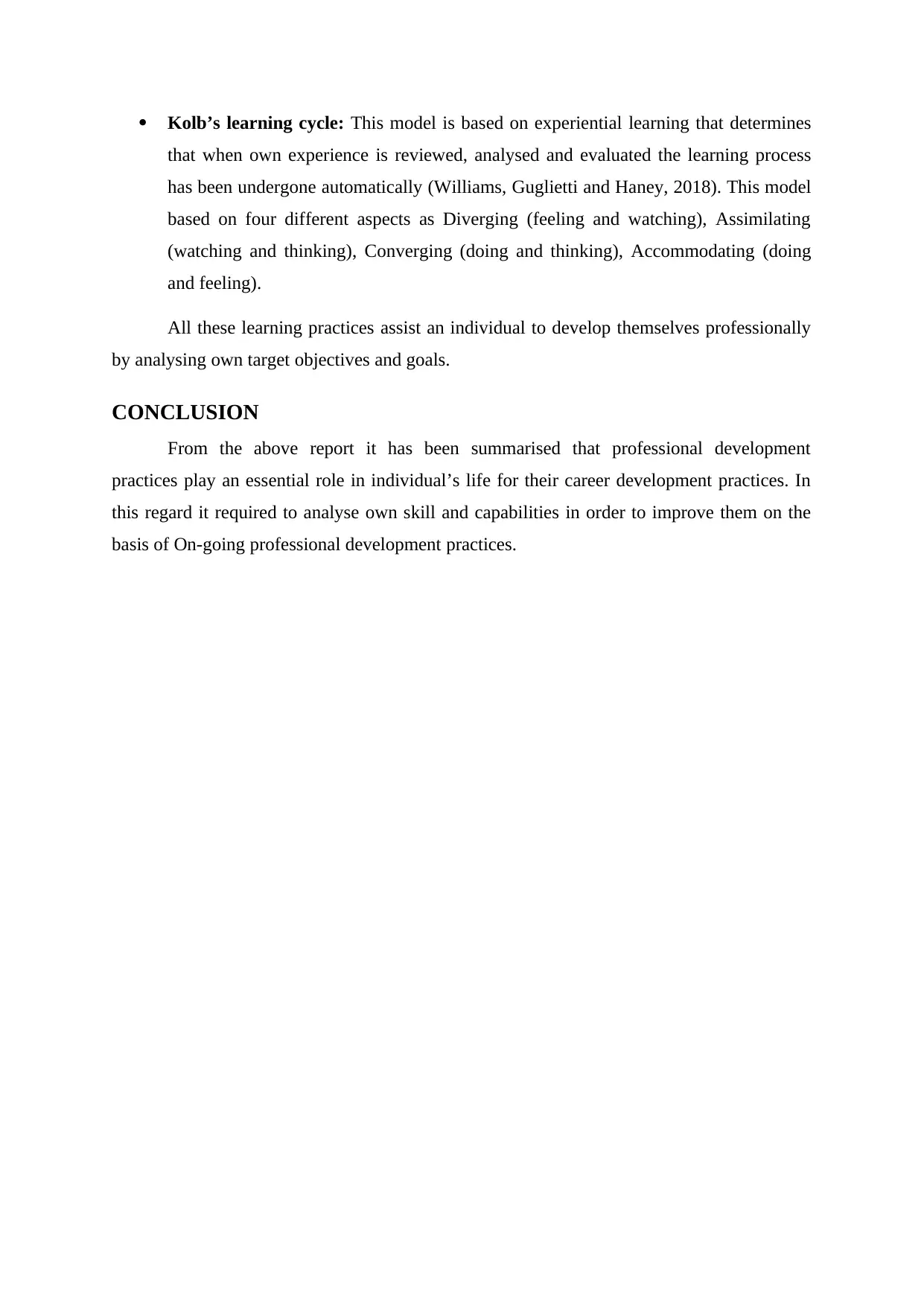
Kolb’s learning cycle: This model is based on experiential learning that determines
that when own experience is reviewed, analysed and evaluated the learning process
has been undergone automatically (Williams, Guglietti and Haney, 2018). This model
based on four different aspects as Diverging (feeling and watching), Assimilating
(watching and thinking), Converging (doing and thinking), Accommodating (doing
and feeling).
All these learning practices assist an individual to develop themselves professionally
by analysing own target objectives and goals.
CONCLUSION
From the above report it has been summarised that professional development
practices play an essential role in individual’s life for their career development practices. In
this regard it required to analyse own skill and capabilities in order to improve them on the
basis of On-going professional development practices.
that when own experience is reviewed, analysed and evaluated the learning process
has been undergone automatically (Williams, Guglietti and Haney, 2018). This model
based on four different aspects as Diverging (feeling and watching), Assimilating
(watching and thinking), Converging (doing and thinking), Accommodating (doing
and feeling).
All these learning practices assist an individual to develop themselves professionally
by analysing own target objectives and goals.
CONCLUSION
From the above report it has been summarised that professional development
practices play an essential role in individual’s life for their career development practices. In
this regard it required to analyse own skill and capabilities in order to improve them on the
basis of On-going professional development practices.
Paraphrase This Document
Need a fresh take? Get an instant paraphrase of this document with our AI Paraphraser
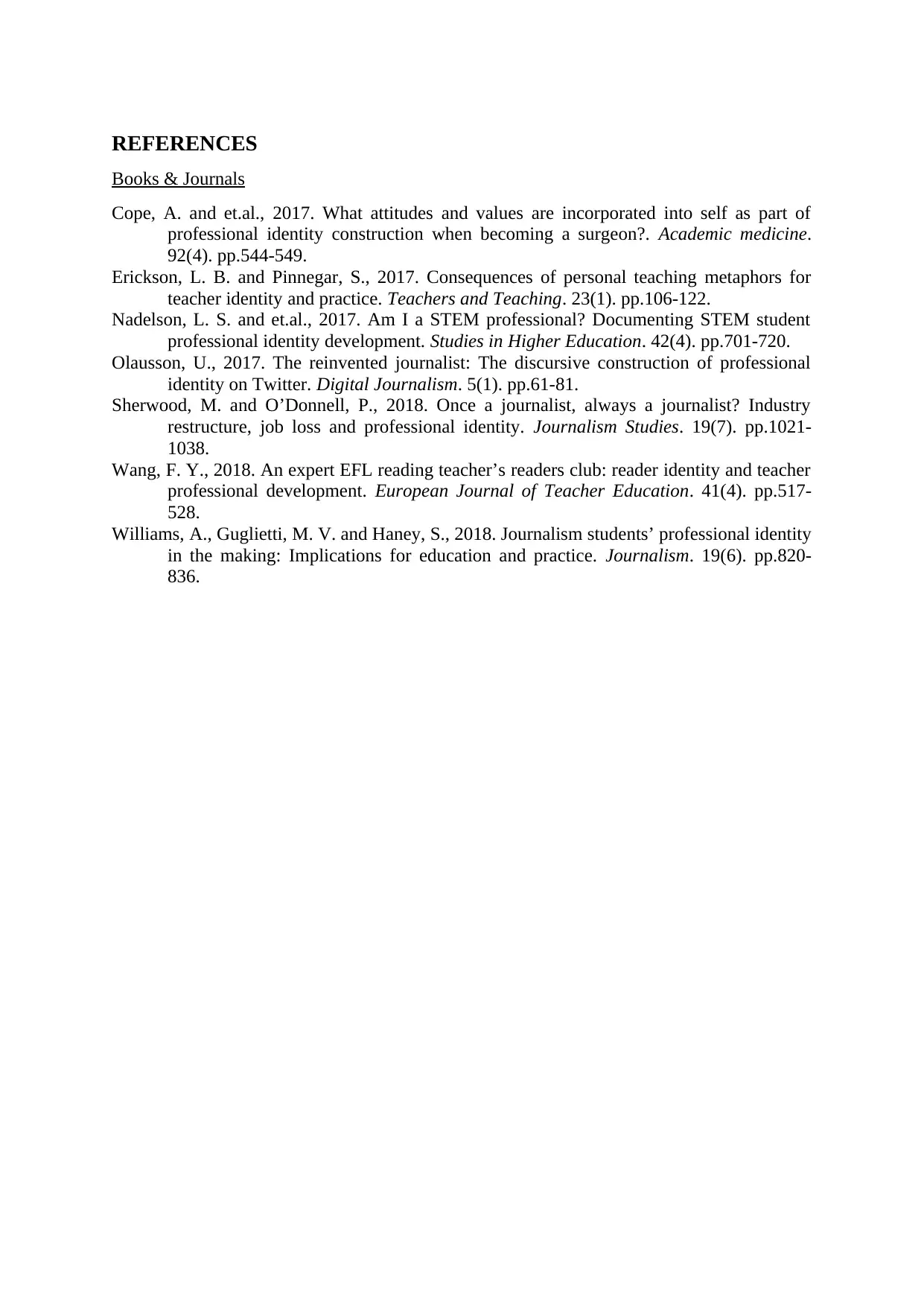
REFERENCES
Books & Journals
Cope, A. and et.al., 2017. What attitudes and values are incorporated into self as part of
professional identity construction when becoming a surgeon?. Academic medicine.
92(4). pp.544-549.
Erickson, L. B. and Pinnegar, S., 2017. Consequences of personal teaching metaphors for
teacher identity and practice. Teachers and Teaching. 23(1). pp.106-122.
Nadelson, L. S. and et.al., 2017. Am I a STEM professional? Documenting STEM student
professional identity development. Studies in Higher Education. 42(4). pp.701-720.
Olausson, U., 2017. The reinvented journalist: The discursive construction of professional
identity on Twitter. Digital Journalism. 5(1). pp.61-81.
Sherwood, M. and O’Donnell, P., 2018. Once a journalist, always a journalist? Industry
restructure, job loss and professional identity. Journalism Studies. 19(7). pp.1021-
1038.
Wang, F. Y., 2018. An expert EFL reading teacher’s readers club: reader identity and teacher
professional development. European Journal of Teacher Education. 41(4). pp.517-
528.
Williams, A., Guglietti, M. V. and Haney, S., 2018. Journalism students’ professional identity
in the making: Implications for education and practice. Journalism. 19(6). pp.820-
836.
Books & Journals
Cope, A. and et.al., 2017. What attitudes and values are incorporated into self as part of
professional identity construction when becoming a surgeon?. Academic medicine.
92(4). pp.544-549.
Erickson, L. B. and Pinnegar, S., 2017. Consequences of personal teaching metaphors for
teacher identity and practice. Teachers and Teaching. 23(1). pp.106-122.
Nadelson, L. S. and et.al., 2017. Am I a STEM professional? Documenting STEM student
professional identity development. Studies in Higher Education. 42(4). pp.701-720.
Olausson, U., 2017. The reinvented journalist: The discursive construction of professional
identity on Twitter. Digital Journalism. 5(1). pp.61-81.
Sherwood, M. and O’Donnell, P., 2018. Once a journalist, always a journalist? Industry
restructure, job loss and professional identity. Journalism Studies. 19(7). pp.1021-
1038.
Wang, F. Y., 2018. An expert EFL reading teacher’s readers club: reader identity and teacher
professional development. European Journal of Teacher Education. 41(4). pp.517-
528.
Williams, A., Guglietti, M. V. and Haney, S., 2018. Journalism students’ professional identity
in the making: Implications for education and practice. Journalism. 19(6). pp.820-
836.
1 out of 8
Related Documents
Your All-in-One AI-Powered Toolkit for Academic Success.
+13062052269
info@desklib.com
Available 24*7 on WhatsApp / Email
![[object Object]](/_next/static/media/star-bottom.7253800d.svg)
Unlock your academic potential
Copyright © 2020–2026 A2Z Services. All Rights Reserved. Developed and managed by ZUCOL.




